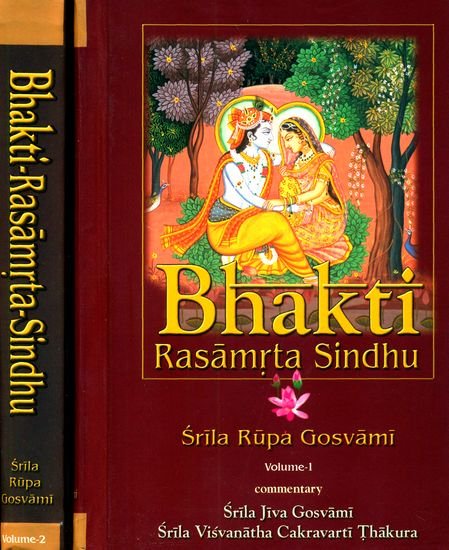Bhakti-rasamrta-sindhu
by Śrīla Rūpa Gosvāmī | 180,912 words
The English translation of the Sri Bhakti-rasamrta-sindhu verse 3.2.154; a medieval era Sanskrit book, written by Rupa Goswami (fl. 15th century) which represents a devotional (bhakti) masterpiece. In this work Goswami describes the nature and different forms of pure love (rasa) as well as various other topics on Vaishnavism and devotion.
Verse 3.2.154
Sanskrit text, Unicode transliteration and English translation:
अस्य भक्तिः —
प्रभावति समीक्ष्यतां दिवि कृपाम्बुधिर् मादृशां
स एष परमो गुरुर् गरुड-गो यदूनां पतिः ।
यतः किम् अपि लालनं वयम् अवाप्य दरोद्धुराः
पुरारिम् अपि सङ्गरे गुरु-रुषं तिरस्कुर्महे ॥३.२.१५३॥asya bhaktiḥ —
prabhāvati samīkṣyatāṃ divi kṛpāmbudhir mādṛśāṃ
sa eṣa paramo gurur garuḍa-go yadūnāṃ patiḥ |
yataḥ kim api lālanaṃ vayam avāpya daroddhurāḥ
purārim api saṅgare guru-ruṣaṃ tiraskurmahe ||3.2.153||
English translation
Sanskrit text, Unicode transliteration and English translation:
हिस् देवोतिओन्:
“ओ प्रभावति! सेए थे लोर्द् ओf थे यदुस् इन् थे स्क्य्, ओउर् गुरु, थे ओचेअन् ओf मेर्च्य् रिदिन्ग् ओन् गरुड. चरेद् fओर् ब्य् हिम् wइथ् थे ग्रेअतेस्त् अffएच्तिओन्, इ हवे अत्तैनेद् सुछ् चोन्fइदेन्चे थत् इ देfएअतेद् थे fएरोचिओउस् त्रिपुरारि इन् बत्त्ले.”
उभयेषां सदाराध्य-धियैव भजताम् अपि ।
सेवकानाम् इहैश्वर्य-ज्ञानस्यैव प्रधानता ।
लाल्यानां तु स्व-सम्बन्ध-स्फूर्तेर् एव समन्ततः ॥३.२.१५४॥His devotion:
“O Prabhāvati! See the Lord of the Yadus in the sky, our guru, the ocean of mercy riding on Garuḍa. Cared for by Him with the greatest affection, I have attained such confidence that I defeated the ferocious Tripurāri in battle.”ubhayeṣāṃ sadārādhya-dhiyaiva bhajatām api |
sevakānām ihaiśvarya-jñānasyaiva pradhānatā |
lālyānāṃ tu sva-sambandha-sphūrter eva samantataḥ ||3.2.154||
English translation
“Though both the servants and the lālyas worship Kṛṣṇa constantly as the person most worthy of worship, awareness of the Lord’s majesty is more prominent in the servants. Identification as the relatives of Kṛṣṇa (His children) is more prominent in the minds of His lālyas.”
